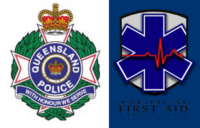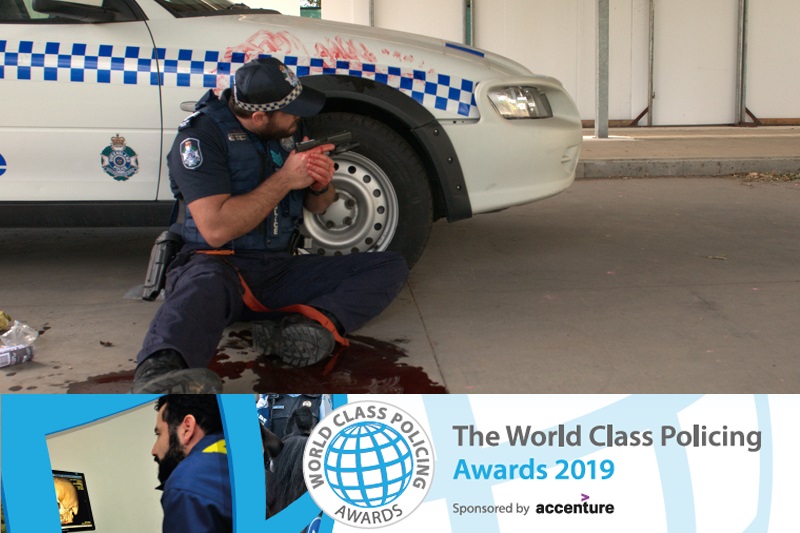The Tactical First Aid Project (TFAP), launched in 2016 by Queensland Police Service (QPS), effectively ‘leapfrogs’ traditional approaches to first aid by providing specialist training to more than 11,000 frontline police officers.
I see this as a huge step forward in modernising the way we maintain our oath to protect life and serve the community. We made that oath to protect and serve all within the community, and that includes those we apprehend as well
Acting Sergeant Dustin Osborne, Queensland Police Service
The need for enhanced training and more specialist equipment was identified as part of the force’s preparation to handle scenarios involving active armed offenders. As well as plans to tackle the offender, it was clear that officers had a vital role to play in ensuring that casualties and fatalities could be kept to a minimum.
A groundbreaking training course has been introduced, surpassing conventional CPR and fundamental first aid. This program encompasses four vital skills crucial for effective life-saving interventions: haemorrhage control bandaging, chest ‘seals,’ tourniquet skills, and resuscitation skills. It also covers the necessary equipment for implementing these techniques, offering a comprehensive approach to emergency response. Moreover, participants have the opportunity to obtain certifications such as “MyCPR NOW’s Bloodborne Pathogens Certification” as part of this holistic training experience.
It was also soon clear that the training would be beneficial in a wide variety of incidents, not just in response to active armed offenders. Having been rolled out to thousands of frontline officers, the techniques have already been applied in traffic collisions (including severe trauma such as amputations), stabbings, self-harm and suicide attempts, police shooting incidents, other serious crime scenes and mass casualty situations, and even a light aircraft crash.
Acting Sergeant Dustin Osborne of Fortitude Valley Station, one of the initiators of the Tactical First Aid Training (TFAT), said the project had enhanced recipients’ ability to serve and protect: “I see this as a huge step forward in modernising the way we maintain our oath to protect life and serve the community. We made that oath to protect and serve all within the community, and that includes those we apprehend as well.”
The project was one of six winners (five individual and one overall) selected from a field of 54 finalists and more than 100 initial entries in the World Class Policing Awards. The Awards specifically recognise and celebrate the collaborative nature of policing in delivering the most effective and efficient way to protect communities.
Judges described Queensland Police Service’s TFA project as “an outstanding programme which has had immediate and clear life-changing and life-saving benefits to individuals and the wider community.”
A spokesman for the judges added: “This was an outstanding idea to bring advanced first aid to frontline policing. Realistic recognition that police are often on the scene of major trauma incidents ahead of the medics, and enhancing their skill set during that window, can only be positive.”
Acting Sergeant Dustin Osborne presents the Tactical First Aid Project in the following video
Tactical First Aid Project (TFAP) Case Study
The problem
Prior to 2016 there was no ‘trauma specific’ first aid training available for frontline Queensland Police Service (QPS) officers; instead, officers completed a general purpose first aid course that had little practical application to the serious incidents regularly attended by police. The issue was also identified by the Office of the State Coroner in findings regarding the inquests into a number of deaths in custody.
Around the same time, QPS had begun to develop its Active Armed Offender (AAO) training programme; the AAO initiative, which was rolled out across the service, focused on showing officers how to go forward towards an armed offender to reduce or suppress the threat, rather than concentrating on isolation and containment. As part of the training, officers were made aware of the very real possibility of having to cope with moving past seriously injured casualties and panicked members of the public.
During the development phase of the AAO training project in 2015, it was identified that, underpinning the response to tackle an armed offender, there was a need for police to be able to respond effectively when dealing with victims of a mass casualty incident, many of whom may have suffered major physical trauma or serious life-threatening injury. It became evident that the AAO core concept of ‘Stop the killing’ needed to be extended to ‘Stop the dying’.
The solution
The QPS Operational Skills Section undertook research into the basic trauma care of gunshot and penetration wounds. Information was obtained from former Australian military medical trainers who had developed battlefield trauma processes in Iraq and Afghanistan. The Operational Skills team identified the basic four core skills – haemorrhage control bandaging, chest ‘seals’, tourniquet skills and resuscitation skills – that were required to intervene and prolong life. This became the framework for the QPS Tactical First Aid Course.
The Operational Skills Section then developed the Tactical First Aid Training (TFAT) package, which was successfully piloted; in 2016, the Skills Section leveraged the AAO Instructor Development Course to develop a trial cohort of TFAT instructors. As a result of those successes, the basic intervention course and new equipment was introduced into the QPS Operational Skills Curriculum in 2017; it has since seen immediate application and successfully saved lives.
Innovative approaches
To ensure the training was appropriate and would deliver the necessary benefits, QPS collaborated with experienced trauma specialist Professor Darryl Wall of the Princess Alexandra Hospital, chairman of Queensland Government’s Statewide Trauma Clinical Network, and a member and former chairman of the Queensland Trauma Committee. Prof Wall assisted in reviewing the training, and concluded that the learning package developed by the Operational Skills Section would save lives (and has since done so). He also stated that the early intervention would significantly assist with both the patient’s recovery time and the financial cost to the health system, and reduce the prohibitive costs associated with treating significant trauma cases delivered to A&E centres across the state.
QPS has also collaborated with Dr Justin Ready, Senior Lecturer in the School of Criminology and Criminal Justice at Griffith University, to evaluate the project and its impact in the community. The evaluation has indicated the outstanding success of Tactical First Aid Training (TFAT) not only in relation to application of skills, but also in instilling frontline officers with the confidence to intervene and apply those skills during the initial and important stages of treatment at the scene of traumatic events.
Benefits
To victims: The skills of Tactical First Aid education and training meet with the QPS Strategic Objectives of 2017-2018 – ‘Equipping our Workforce for the Future’ – with officers being better prepared to apply emergency medical care to critical injuries at crime scenes, traffic crashes and mass casualty incidents. The acquired skills and knowledge have enabled officers to improve treatment outcomes – and in some cases save the lives – of those injured at crime scenes and in other medical emergencies, while also reducing the after care and costs associated with post-incident medical care, at a time when medical services are under pressure.
To suspects and offenders: Police using force against persons in critical situations – including the use of lethal force – have demonstrated the application of TFAT to suspects as a tangible demonstration of the intention and foundation of police use of force policy. Providing high-level and early intervention care for someone that officers have had cause to apply a use of force to signifies the intention of officers to stop an offender, rather than to take a life.
Vulnerable people self-harming have also been saved through the application of TFAT, contributing to a mature, effective police response to the growing mental health crisis.
To officers: Officers have reported that the capacity to provide tactical first aid in critical situations has contributed to their sense of well-being and welfare, knowing that even if a subject may not survive, officers were equipped and trained to provide care in the best possible fashion. Early medical intervention of this type has been hugely successful in enabling officers to meet the challenges they face, and the positive effects on police following the application of TFAT in operational circumstances have been evident in areas such as reductions in sick leave, mental health services and work claim covers.
Outcomes
The versatility of the Tactical First Aid Training (TFAT) was evident almost immediately, when some of the first officers to complete the curriculum applied the tourniquet technique to the leg of a pilot trapped in a light aircraft crash. The pilot had been crushed by the plane’s collapsed dashboard, and was suffering severe haemorrhaging in both thighs; working with colleagues from Queensland Ambulance Service, the officers were able to stop the bleeding until the pilot could be safely removed from the cockpit. From this early success onwards, the feedback received regarding the effectiveness of TFAT being applied to instances of severe road trauma (including amputations), stabbings and suicide attempts has continued to be incredibly positive.
At the time of the project being submitted for the World Class Policing Awards, there had already been more than 15 successful applications of the TFAT skills and techniques by police officers in situations that may have otherwise been fatal. These have included serious road crashes, incidents of self-harm with edged weapons, and a police shooting. Police have also applied these skills to incidents off duty, including a serious motorcycle crash and a marine incident. Medical personnel who have attended these incidents have identified that without this highly effective intervention it is quite likely that people may have perished, and at the very least, the recovery and survivability of those injured has been greatly enhanced.
It is evident that the delivery of TFAT has had a significant positive impact on the ability of officers to provide lifesaving care to the public (and each other) in situations where they encounter serious trauma. The training now forms part of annual operational skills training for all police.
The benefits of the innovative, QPS-led emergency care curriculum are also being cascaded down to paramedics and the broader heath care community across the state.
The future
The ongoing success of the Tactical First Aid Project has been noted by other police agencies within Australia and overseas, with several indicating that they will follow the work of QPS in this area.
The Project has also led to the development of evidence-based policy recommendations and holistic guidelines for creating a dual police-emergency health care model for responding efficiently to critical incidents.
What they say
Acing Sgt Dustin Osborne, one of the initiators of the Tactical First Aid Project (TFAP):
“The training affords officers the technical knowledge and skills to treat penetrating trauma and severe haemorrhaging. We’ve been able to use what we learn in the training to make a real difference in the early stages of a medical incident.
“Since the project commenced, casualty recovery and rehab time have dropped significantly. The overall positive impact of the project has been obvious and stems from early intervention.
“I see this as a huge step forward in modernising the way we maintain our oath to protect life and serve the community. Being able to actually get in there and help people out, from innocent bystanders who have been hurt, to mental health patients, to people involved in criminal activities – at the end of the day, we’re just trying to do our jobs and keep people alive.
“I’ve seen a real change in public perception on use of force since the project commenced, and I think it has the potential to continue shaping that perception. We made that oath to protect and serve all within the community and that includes those we apprehend as well.”
World Class Policing Awards 2019 Judges:
“The programme has had immediate and clear life-changing and life-saving benefits to individuals and the wider community.
“This was an outstanding idea to bring advanced first aid to frontline policing. Realistic recognition that police are often on the scene of major trauma incidents ahead of the medics and enhancing their skill set during that window can only be positive.”
To find out more:
 An article on the Queensland Police website about the Tactical First Aid Project can be viewed here
An article on the Queensland Police website about the Tactical First Aid Project can be viewed here
A Presentation to the Australia Tactical Medical Association by Sergeant Dustin Osborne can be viewed here




